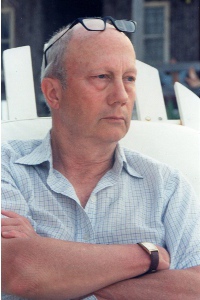Rising to Condoms’ Defense

By M. Christian
YNOT – Quick: What do you think of when you hear the word condom? For some in the adult industry, the first response may be a grimace as a few California municipalities recently passed laws mandating condom use in all sexually explicit productions.
But far too few people think of condoms — and all the other kinds of safer-sex products available today — as affirmations and indications of respect for life. For each safer-sex product made, sold and used, two people may have been spared disease or death.
While the content-production portion of the adult entertainment industry, at least in California, chafes under new condoms-required legislation, people in developing countries are learning how condoms, sex education, family planning, oral contraceptives and a host of other sexual wellbeing considerations can improve the quality of their lives. In parts of Africa, for example, traditionally poor communication about safer-sex practices has led to the spread of sexually transmitted diseases that can be life-threatening.
At the forefront of the mission to get condoms into developing countries and educate everyday people about their correct use is DKT International.
Founded in 1989, DKT International’s core mission is “to provide safe and affordable options for family planning and HIV prevention through social marketing.” The organization spearheads 19 programs in 18 countries, and in 2011 provided 650 million condoms, more than 72 million cycles of oral contraceptives, more than 14 million injectable contraceptives, one million IUDs and 12 million misoprostol pills. DKT’s statistics indicate that last year its efforts prevented seven million pregnancies, 11,000 maternal deaths and 1.4 million abortions.
In other words, DKT International is saving lives by addressing an issue that all too often is ignored or suppressed: sex.
DKT has strong ties to the adult industry: The organization was founded by Phil Harvey, who founded adult products giant Adam & Eve. Harvey’s obsession with improving people’s sex lives is not just business — it’s also an ethical crusade. With the assistance of newly appointed Executive Vice President Chris Purdy and more than 1,800 on-the-ground employees, DKT is making an impact.
YNOT asked the two men about their mission, their successes and their efforts to provide safe, affordable and effective family planning products and services in areas where such notions previously weren’t even imagined.
YNOT: You’ve said attitudes about condoms are changing, even in conservative countries. Can you share a few moments of satisfaction and success, perhaps in a situation where even the idea of contraception was problematic?
 Chris Purdy: Part of what DKT does is take risks to promote condoms and educate people on their use. Condom promotion sometimes raises eyebrows because some people think that promoting condoms is the same as promoting sex. I think that’s like saying umbrellas promote rain.
Chris Purdy: Part of what DKT does is take risks to promote condoms and educate people on their use. Condom promotion sometimes raises eyebrows because some people think that promoting condoms is the same as promoting sex. I think that’s like saying umbrellas promote rain.
What have we done to change attitudes? We educate people to make the choices they want to protect themselves from pregnancy. Even in conservative countries like Indonesia and Ethiopia, people understand this idea, and controversy tends not to be long-lived. We mostly do this through mass media approaches: advertising on TV, radio and print and ‘normalizing’ condom use so it just becomes part of the sexual-health landscape. One of my personal success stories is from Indonesia, acountry of 230 million people where I lived for nearly 10 years selling condoms. When I arrived, the entire condom market was around 25 million pieces. Today, DKT alone sells more than 100 million condoms. This is from the changes in behavior we have seen from the collective efforts of DKT and other organizations.
You’ve mentioned the power of social networking. How do you use social media to spread DKT’s message?
Purdy: On social media, we are using the same tools and techniques that many other commercial players are using: Facebook, Twitter, YouTube. One reason this is so effective is that it plays to synergistic strengths: sex and the internet. Promoting condoms on social media makes sense, because that is where a lot of people are spending time trying to meet people, looking at sexy pictures and so on. We try to both build brands and engage consumers through social media and also, in some markets, promote sales.
What are your plans for the future?
 Phil Harvey: DKT sold 650 million condoms last year. We continue to do everything we can to make condom use pleasurable and fun. Flavors, dots, aromas…. Strawberry is the most popular in most countries.
Phil Harvey: DKT sold 650 million condoms last year. We continue to do everything we can to make condom use pleasurable and fun. Flavors, dots, aromas…. Strawberry is the most popular in most countries.
There’s little question condoms can make sex safer in some situations, but we’re curious: Since DKT promotes condom usage and Adam & Eve now produces its own films in addition to selling every condom under the sun, how do you feel about mandating condoms on adult movie sets?
Harvey: Mandatory condom use is basically a violation of civil and privacy rights. Several adult performers are married couples, for example, and have little need for condoms. As a constitutional matter, such couples could not be forced to practice contraception against their will. Further, enforcement [of condom usage] would be a violation of privacy.
I’m in favor of condom use. Condoms should always be available on the set, and performers should be encouraged to use them. Coercion is another matter.
Phil Harvey is a social marketing pioneer. With Tim Black, he founded Populations Services International in 1972 and headed the organization for seven years. In 1989 he founded DKT International, which now serves Asia, Africa and Latin America. He is the author of Let Every Child Be Wanted: How Social Marketing is Revolutionizing Contraceptive Use Around the World, and of more than 20 published articles about international development, family planning and the use of social marketing techniques to address those challenges.
Chris Purdy is the executive vice president of DKT International. From 1996-2011, he served in various positions including country director in Ethiopia, Turkey and Indonesia, where he managed the largest social-marketing family planning program in the world. His professional interests center on improved health, socially responsible enterprises and digital health communications.









